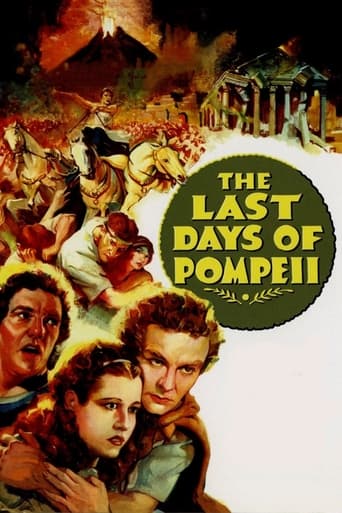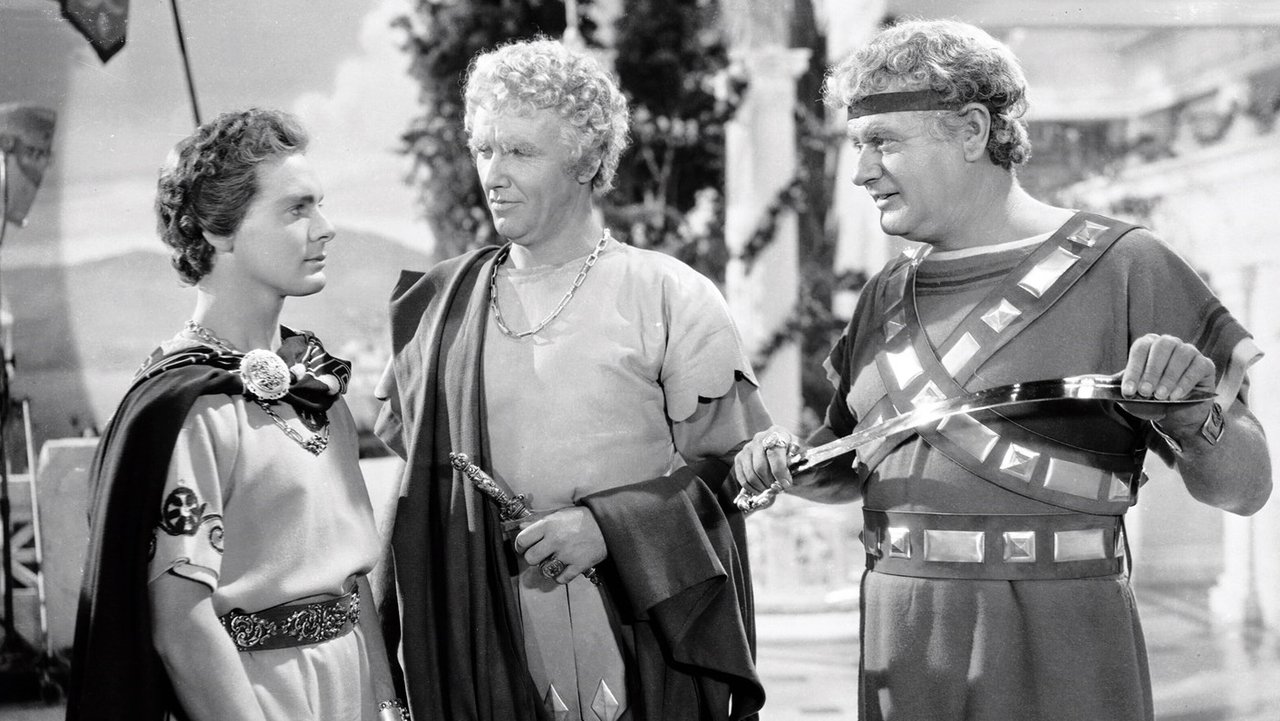JLRMovieReviews
Blacksmith Marcus (Preston Foster) is living in the days of Pompeii with his wife and baby boy. They are just getting by, enough to be reasonably happy. By fortuitous chance, he saves the life of a gentleman of the hierarchy who gives him a gold coin. To spend it on a whim, he and wife go to the market, but there an accident takes the life of his wife. He tried to make money as a gladiator to pay a doctor to come to her aid, but he was too late. He and his son now live an existence without much except for each other. Fast forward. The boy is now a young man, who empathizes for the poor, the helpless, those who are thrown in the stadium for the gladiators' amusement and target. But life has hardened Marcus. Someday he will be a gladiator with no feelings for those who can't help themselves. Through these feelings and subsequent events, Marcus and son are pitted against each other. In the first few minutes of this film, I was very wary of this. Actor Preston Foster, of whom I was accustomed to seeing in westerns and b-pictures, is now is an historical movie about Rome! But as those opening events occurred, I began to put myself in his place, and we the viewer and drawn into the Roman days of kill or be killed. Preston Foster was good as Marcus, but Basil Rathbone stole all the scenes he was in as Pontius Pilate, and Alan Hale and Louis Calhern give good support. This is a grade-A production that showcases the bloodthirsty days of Pompeii, culminating in special effects and a very underplayed ending. Mount Vesuvius explodes and the quiet aftermath with consequences and affirmation. "The Last Days of Pompeii" is a good film, mirroring those days told in books that linger in the mind of those longing for knowledge and what came before
.
dougdoepke
No need to repeat the plot. Ordinarily this sort of costume spectacle would have been done by a big-budget studio like MGM or TCF. But the makers of King Kong (Cooper & Shoedsack) were special-effects wizards, so RKO put them to work again, hoping I guess for another box-office smash like Kong. I'm not sure why the movie flopped (IMDB), but apparently it did. The movie does lack big name stars, though Foster cuts a virile figure as the poor man who makes good. Plus, the middle part sort of sags as we await the big event.Then too, there's not the expected skimpy costumes or dancing girls to spice up the heavy religious message, suggesting someone should have called up that crafty old master of biblical spectacle, CB De Mille. In fact, there's little depiction of notorious Roman decadence outside of their blood sports. Thus, when judgment day comes, courtesy Mt. Vesuvius, there's not the usual satisfaction of seeing all the sinning and sinners get punished.Nonetheless, the special effects remain pretty impressive, even in our digital age. Too bad, however, we don't see more of that towering Goliath statue. It's still a real grabber. And when it comes crashing down, we get the message. Speaking of messages, if you're a skeptic like me, put off by the heavenly choirs and ethereal lighting, take the narrative as a worthwhile morality tale instead of Hollywood's proved pathway to heaven.
telegonus
The Last Days Of Pompeii tells the story of a poor blacksmith in ancient Rome who becomes a gladiator and in turn a wealthy man, while his son, upon encountering Jesus, grows up to become a Christian. The film is a spectacle from the middle thirties, after the De Mille manner, which is to say it tries to look big but is actually, upon closer examination, at best mid-sized. RKO didn't really have the bucks to make a film on as lavish a scale as they surely would have wished. The film has many flaws, but also virtues. It was made by the King Kong team of Ernest Schoedsak and Merian Cooper, who were very resourceful gentlemen, highly creative and not at all like other Hollywood film-makers, and therefore the movie has a unique style that's difficult to put into words. The best way I can describe their approach is to say that it's highly individual; its makers had their own way of doing things, and therefore told their their story, or more properly showed it, so that the movie doesn't resemble other films with similar themes. Also on the plus side is its cast, not of thousands, maybe of hundreds; more likely of dozens. In the leading role Preston Foster's anchors the film in a kind of emotional reality. He may not have been the most versatile of actors but he was a most sincere one, and he is excellent in the lead. Also good is Basil Rathbone as Pontius Pilate, surprisingly unhammy. It's a very good movie overall, hokey as hell but always watchable, and in the end, while the spectacle of Mount Vesuvius erupting isn't all it might be, the movie as whole at least holds firm, and I for one was moved by it, not to tears maybe, but in a more modest way, by the smaller, more intimate tale of a good man who comes to his senses too late, at least for redemption in this world.
Ron Oliver
Conscious stricken after abandoning Christ on the way to Golgotha, a jaded slave trader witnesses THE LAST DAYS OF POMPEII, and the city's horrific destruction.Although burdened with occasional wooden acting, this is generally a fine historical drama. RKO spent quite a bit of money on its production and it shows in the large crowd scenes and still noteworthy special effects. The film boasted a very fine team behind the camera, working together as they had on KING KONG (1933). Directorial duties were shared by Ernest B. Schoedsack & Meriam C. Cooper. Special effects wizard Willis O'Brien worked his magic, while composer Max Steiner contributed a pounding score.Preston Foster had one of his finest roles as the stalwart blacksmith turned gladiator and slaver. His performance during the prolonged climax, while desperately trying to save the life of his doomed son, is especially effective. David Holt & John Wood, playing the youth at different ages, are also very good.Additional fine support is offered by Alan Hale as the rough mercenary who teams with Foster; and by villainous Louis Calhern as Pompeii's last prefect. Acting honors, however, go to marvelous Basil Rathbone, who gives a most sophisticated performance as Pontius Pilate, by turns rogue, fate's victim & moral philosopher.Movie mavens should recognize Ward Bond as a boastful gladiator, elderly Zeffie Tilbury as a soothsayer, Edward Van Sloan as Pilate's clerk & Edwin Maxwell as a Pompeii official, all uncredited.******************************The film makes rather a mishmash of historical chronology. Young Flavius appears to be about ten years old at the time of Christ's crucifixion, which occurred around AD 29. It would be another fifty years - August 24, AD 79, to be precise - until Vesuvius' eruption destroyed Pompeii, yet Flavius is still depicted as a youthful fellow, just reaching maturity. Early Christian tradition also holds that Pilate committed suicide in AD 39 - four decades before Pompeii's rendezvous with destiny.While using the same title & location, this film tells quite a different story from that of the classic 1834 novel by Baron Bulwer-Lytton.


 AD
AD


